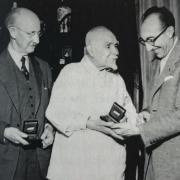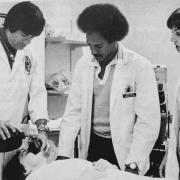The Department of Surgery at Tulane University has a very rich history including many "firsts" and many influential leaders in our field.
Charity Hospital was founded in 1736 and continued as a Level 1 trauma center until Hurricane Katrina in 2005. In 1859, Charity Hospital was the largest hospital in the world, admitting 12,775 patients and had fourth-largest medical school in the country.
in 1834, the Medical College of Louisiana was founded which later became Tulane University School of Medicine.
The Department of Surgery at Tulane has housed many prominent leaders in surgery including Dr. Rudolph Matas, Dr. Edward William Alton Ochsner, Dr. Michael E. Debakey, Dr. Norman McSwain, Dr. Ronald Nichols, and Dr. Bernard Jaffe.
Department of Surgery Timeline
1736: Hospital of Saint John/ L’Hôpital des Pauvres de la Charité opens as the second public hospital in the U.S.
1834: Medical College of Louisiana founded by Dr. Thomas Hunt, Dr. John H. Harrison and Dr. Warren Stone.
1847: University of Louisiana established and Medical College of Louisiana assumed into the school, with an emphasis on practical instruction and clinical training at Charity Hospital.
1859: Charity Hospital is the largest hospital in the world and fourth-largest medical school in the country.
1882: University of Louisiana becomes Tulane University of Louisiana.
1884: The Medical Department of the University of Louisiana becomes part of the newly founded, private Tulane University.
1886: Tulane University establishes first premedical course.
1888: Dr. Matas performs the first successful endoaneurysmorrhaphy on a traumatic brachial artery aneurysm, widely regarded as the birth of modern vascular surgery. Dr. Rudolph Matas recognized as the “Father of Vascular Surgery”.
1895: A.B. Miles Surgical Amphitheater completed.
1910: Survey of American and Canadian medical schools ranks Tulane University in the nation’s top eight.
1914: Dr. Alberto Garcia performs the first open heart surgery in Louisiana on a young black patient who arrived at Charity Hospital during Mardi Gras.
1930: The Tulane School of Medicine moves from Hutchinson Memorial Building (Canal Street) to new Hutchinson Memorial Building (Tulane Ave.), next to old Charity Hospital.
1925: Rockefeller General Education Fund grant funds first full-time appointment of Chairman of the Department of Surgery, Dr. E.W. Alton Ochsner
1936: Dr. Alton Ochsner performs first pneumonectomy in the Deep South.
1939: Dr. Alton Ochsner discovers the link between tobacco use and lung cancer.
1958: Dr. Rudolph Matas dies at age 97 and donates personal book collection to Tulane — now known as the Matas Tulane Library.
1976: Dedication of Tulane University Hospital and Clinic.
1978: Dr. Norman McSwain establishes Emergency Medical System in New Orleans.
1971: Dr. Ronald Nichols creates Nichols-Condon bowel prep protocol.
1995: Dr. Bernard Jaffe performs one of the first living-related donor small bowel transplants.
2005: Charity Hospital, one of the oldest continually operating public hospitals, closed after devastating damage from Hurricane Katrina. Drs. Doug Slakey and James Korndorffer rebuild the general surgery program.
2016: Dr. Mary T. Killackey is appointed Chair of Surgery, the first woman to serve as Chair in the department’s history.
2023: Tulane University is the first to perform a robotic kidney transplant in the Gulf Coast region.

Dr. Matas is seen here presenting the Rudolph Matas award in Vascular Surgery to Dr. Debakey (Right) in 1954
Dr. Rudolph Matas was recognized by the surgical community as the "Father of Vascular Surgery." Sir William Osler hailed him as "that modern Antyllus."
Dr. Alton Ochsner conducted investigations that led to his early belief in a link between smoking and lung cancer. He performed the first pneumonectomy in the Deep South in 1936. He also is known for his influence on surgical training. He used a 'bullpen" style to grill medical students and residents on their diagnoses which was featured in an 1956 article in Time magazine. This method is still in use today in our current medical student curriculum.
Dr. Michael Debakey was born in Lake Charles, Louisiana, in 1908. He earned his bachelor's degree from Tulane University while enrolling in the medical school at the same time, earning both degrees in 1932. He trained under Drs. Alton Ochsner and Rudolph Matas, completing his residency at Charity Hospital. He later worked at Tulane surgical faculty 1937-1948 after which he took leave during WWII to work for the United States Surgeon General. He later became chair at Baylor University in Houston.
Dr. Norman McSwain joined the staff of the Department of Surgery to work at Charity Hospital in 1977. He established an Emergency Medical System (EMS) in New Orleans. He served as the police surgeon for the NOPD. He helped establish the Advanced Trauma Life Support (ATLS) course. He also created a version of ATLS to be used for paramedics and EMTs, later known as Pre-Hospital Trauma Life Support "PHTLS."
Dr. Ronald Nichols created the Nichols-Condon bowel prep. He performed a set of experiments, defining bowel microbial flora. He used this data to develop his protocol for neomycin/erythromycin, still used in colorectal surgery today. Dr. Nichols is now an emeritus Professor at Tulane for the Department of Surgery.
Dr. Bernard Jaffe was one of the first surgeons to perform living-related donor small bowel transplants.

Dr. Norman McSwain seen here teaching proper bag-valve ventilation to EMT students in 1978.
During Hurricane Katrina in 2005, the city of New Orleans was devastated, with damage to Tulane and Charity hospitals. The residency program was also left in shambles. Drs. Doug Slakey and James Korndorffer worked to completely rebuild the general surgery program, creating relationships with surgeons throughout the city to improve the training for the surgical residents. Thanks to both Dr. Slakey and Dr. Korndorffer, Tulane General Surgery Residency program has become one of the most modern surgery programs but with a history of being the 3rd oldest program in the country.
Tulane University Department of Surgery Chairmen
1835-1837 Charles Aloysius Luzenberg
1837-1872 Warren Stone
1872-1889 Tobias Gibson Richardson
1889-1893 Samuel Logan
1893-1894 Albert Baldwin Miles
1895-1927 Rudolph Matas
1927-1956 Edward William Alton Ochsner
1956-1967 Oscar Creech Jr.
1967-1968 Edward Thomas Krementz (Acting)
1968-1975 Theodore Drapanas
1975-1977 Robert Frank Ryan (Acting)
1977-1989 Watts Webb
1989-1999 Lewis M. Flint
2000-2006 Robert L. Hewitt
2006-2016 Douglas P. Slakey
2016- present Mary Killackey
Content taken from Innovation and Perseverance: A History of the Tulane University Department of Surgery
